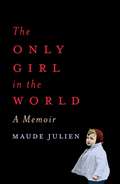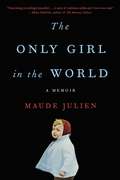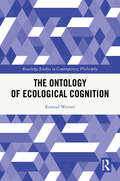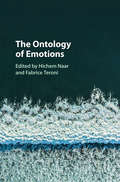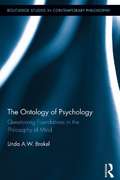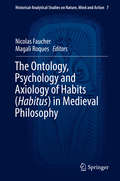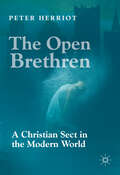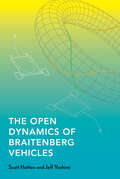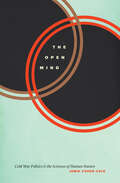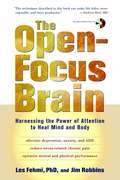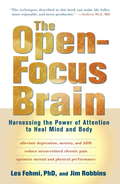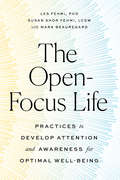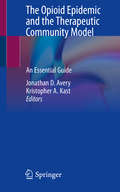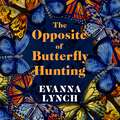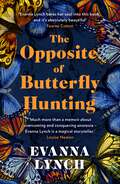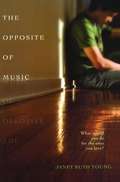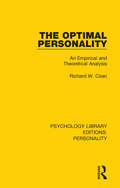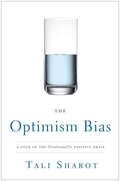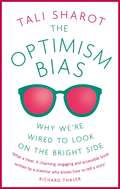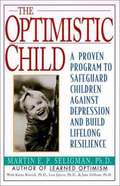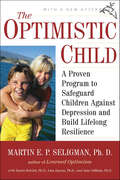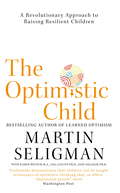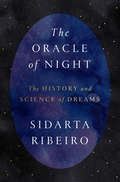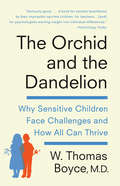- Table View
- List View
The Only Girl in the World: A Memoir
by Maude JulienFor readers of Damaged and Running with Scissors, a chilling exploration of psychological control that ends with a glorious escape. Maude still remembers the sound of the gate being locked behind her. She was three years old when they moved into the secluded manor and in the coming years, she would only be allowed out a handful of times. Her parents belonged to a fanatical Masonic order. She followed a strict schedule of study, hard labour and endless drills designed to &‘eliminate weakness&’, such as holding an electric fence without flinching and sitting in a rat-infested cellar. But despite their chilling psychological control, her parents could not control her inner life. Befriending animals on the lonely estate and characters in the books she read, Maude nurtured in herself the compassion and love her parents forbade.
The Only Girl in the World: A Memoir
by Maude JulienAN AMAZON BEST BOOK OF THE MONTH. For readers of Room and The Glass Castle, an astonishing memoir of one woman rising above an unimaginable childhood. Maude Julien's parents were fanatics who believed it was their sacred duty to turn her into the ultimate survivor--raising her in isolation, tyrannizing her childhood and subjecting her to endless drills designed to "eliminate weakness." Maude learned to hold an electric fence for minutes without flinching, and to sit perfectly still in a rat-infested cellar all night long (her mother sewed bells onto her clothes that would give her away if she moved). She endured a life without heat, hot water, adequate food, friendship, or any kind of affectionate treatment.But Maude's parents could not rule her inner life. Befriending the animals on the lonely estate as well as the characters in the novels she read in secret, young Maude nurtured in herself the compassion and love that her parents forbid as weak. And when, after more than a decade, an outsider managed to penetrate her family's paranoid world, Maude seized her opportunity. By turns horrifying and magical, The Only Girl in the World is a story that will grip you from the first page and leave you spellbound, a chilling exploration of psychological control that ends with a glorious escape.
The Ontology of Ecological Cognition (Routledge Studies in Contemporary Philosophy)
by Konrad WernerThis book provides the first explicit examination of the underlying ontology of the ecological/embodied cognition philosophical project. More specifically, it examines the locative concepts used by defenders of representationalism and the more environmentally oriented, ecological/embodied views on cognition.The book’s main argument is that ecological/embodied cognition is embedded in various philosophical traditions. It establishes that there is a lack of clarity in how we conceptualize locative relations in contexts having to do with cognition. The book tackles questions of what it means that internal representations are internal, that the external world is external, that the extended mind is extended, how we should understand the claim that cognition and consciousness are in the head, or, alternatively, in the environment. Additionally, it addresses what it means that cognition enacts an environment, which is likely the most controversial claim made in some branches of embodied cognition. The goal of the book is to capture the essential traits of cognition thought of as an ecological phenomenon – as a factor determining a specific locus – and thereby elicit how cognition takes part in the creation of the world as we know it.The Ontology of Ecological Cognition will appeal to scholars and graduate students working in philosophy of mind, cognitive science and metaphysics.
The Ontology of Emotions
by Hichem Naar Fabrice TeroniThe nature of emotion is an important question in several philosophical domains, but little attention has so far been paid to identifying the general ontological category to which emotions belong. Given that they are short-lived, are they events? Since they often have components or stages, are they processes? Or does their close link with behaviour mean they are dispositions? In this volume, leading scholars investigate these basic ontological issues, contributing to current discussions about emotions and paving the way for new research into an underexplored area of philosophy. With chapters addressing issues including the temporal profile of emotions, the distinction between emotions and other affective states, and the epistemology of emotion, this highly original book will be valuable for students and specialists of philosophy, and particularly for those working in the metaphysics of mind and emotions.
The Ontology of Psychology: Questioning Foundations in the Philosophy of Mind (Routledge Studies in Contemporary Philosophy)
by Linda A.W. BrakelIn this volume, Brakel raises questions about conventions in the study of mind in three disciplines—psychoanalysis, philosophy of mind, and experimental philosophy. She illuminates new understandings of the mind through interdisciplinary challenges to views long-accepted. Here she proposes a view of psychoanalysis as a treatment that owes its successes largely to its biological nature—biological in its capacity to best approximate the extinction of problems arising owing to aversive conditioning. She also discusses whether or not "the mental" can have any real ontological standing, arguing that a form of reductive physicalism can be sufficient ontologically, but that epistemological considerations require a branch of non-reductive physicalism. She then notes the positive implications of this view for psychiatry and psychoanalysis, Finally, she investigates the role of "consistency" in method and content, toward which experimental philosophers strive. In essence, Brakel articulates the different sets of challenges pertaining to: a) ancient dilemmas such as the mind/body problem; b) longstanding debates about the nature of therapeutic action in psychoanalysis; and c) new core questions arising in the relatively young discipline of experimental philosophy.
The Ontology, Psychology and Axiology of Habits (Historical-Analytical Studies on Nature, Mind and Action #7)
by Magali Roques Nicolas Faucher<p>This book features 20 essays that explore how Latin medieval philosophers and theologians from Anselm to Buridan conceived of habitus, as well as detailed studies of the use of the concept by Augustine and of the reception of the medieval doctrines of habitus in Suàrez and Descartes. Habitus are defined as stable dispositions to act or think in a certain way. This definition was passed down to the medieval thinkers from Aristotle and, to a lesser extent, Augustine, and played a key role in many of the philosophical and theological developments of the time. <p>Written by leading experts in medieval and modern philosophy, the book offers a historical overview that examines the topic in light of recent advances in medieval cognitive psychology and medieval moral theory. Coverage includes such topics as the metaphysics of the soul, the definition of virtue and vice, and the epistemology of self-knowledge. The book also contains an introduction that is the first attempt at a comprehensive survey of the nature and function of habitus in medieval thought. <p>The material will appeal to a wide audience of historians of philosophy and contemporary philosophers. It is relevant as much to the historian of ancient philosophy who wants to track the historical reception of Aristotelian ideas as it is to historians of modern philosophy who would like to study the progressive disappearance of the term “habitus” in the early modern period and the concepts that were substituted for it. In addition, the volume will also be of interest to contemporary philosophers open to historical perspectives in order to renew current trends in cognitive psychology, virtue epistemology, and virtue ethics.</p>
The Open Brethren: A Christian Sect in the Modern World
by Peter HerriotThis book gives a personal insight into the hearts and minds of a fundamentalist Christian sect, the Open Brethren. Using Brethren magazine articles, obituaries, and testimonies, Peter Herriot argues that the Brethren constitute a perfect example of a fundamentalism. Their culture is entirely opposed to the beliefs, values, and norms of modernity. As a result, like other fundamentalisms they challenge modern Christianity and impede its efforts to engage with global society.
The Open Dynamics of Braitenberg Vehicles
by Jeff Yoshimi Scott HottonAn introduction to dynamical systems theory, a detailed mathematical analysis of pairs of Braitenberg vehicles, and a look at how these results apply to the study of physical and biological organisms.Powering the concept of a Braitenberg vehicle, developed in 1984 by the Italian-Austrian cyberneticist Valentino Braitenberg, is the idea that simple systems can produce complex behaviors. A pair of interacting Braitenberg vehicles is simple, but they can meander, wind around, and follow each another in a number of ways. In this book, Scott Hotton and Jeff Yoshimi show how dynamical systems theory—in particular the theory of open dynamic systems—can be used to analyze pairs of these vehicles in great detail. The result of the authors&’ long-standing collaboration at the intersection of mathematics, philosophy, cognitive science, and biology, The Open Dynamics of Braitenberg Vehicles offers a rigorous mathematical foundation for embodied cognition, especially when it comes to two-way interactions between an agent and its environment.Following an introduction to dynamical systems theory, and the most detailed mathematical analysis of Braitenberg vehicles to date, Hotton and Yoshimi discuss how their results can be applied to the study of physical and biological systems. They also describe their work's relevance to debates in the philosophy of embodied cognitive science. Combining the best features of embodied and representational approaches to cognitive science, complete with code and simulations, The Open Dynamics of Braitenberg Vehicles provides an extremely accessible and visually rich look into the workings and applications of open dynamical systems.
The Open Mind: Cold War Politics and the Sciences of Human Nature
by Jamie Cohen-ColeThis study chronicles the rise of psychology as a tool for social analysis during the Cold War Era and the concept of the open mind in American culture. In the years following World War II, a scientific vision of the rational, creative, and autonomous self took hold as an essential way of understanding society. In The Open Mind, science historian Jamie Cohen-Cole demonstrates how this notion of the self became a defining feature of Cold War culture. From 1945 to 1965, policy makers used this new concept of human nature to advance a centrist political agenda and instigate nationwide educational reforms that promoted more open, and indeed more human, minds. The new field of cognitive science was central to this project, helping to overthrow the behaviorist view that the mind either did not exist or could not be studied scientifically. While the concept of the open mind initially unified American culture, this unity started to fracture between 1965 and 1975, as the ties between political centrism and the scientific account of human nature began to unravel. During the late 1960s, feminists and the New Left repurposed psychological tools to redefine open-mindedness as a characteristic of left-wing politics. As a result, once-liberal intellectuals became neoconservative, and in the early 1970s, struggles against open-mindedness gave energy and purpose to the right wing.
The Open-Focus Brain: Harnessing the Power of Attention to Heal Mind and Body
by Jim Robbins Les FehmiIn this health book, Dr. Les Fehmi a pioneering researcher and clinician teams up with Jim Robbins, an award-winning science writer, to present a disarmingly simple idea: the way we pay attention in daily life plays a critical role in our health and well-being.
The Open-Focus Brain: Harnessing the Power of Attention to Heal Mind and Body (Personal Development Ser.)
by Jim Robbins Les FehmiThis breakthrough book presents a disarmingly simple idea: The way we pay attention in daily life can play a critical role in our health and well-being. According to Dr. Les Fehmi, a clinical psychologist and researcher, many of us have become stuck in "narrow-focus attention": a tense, constricted, survival mode of attention that holds us in a state of chronic stress--and which lies at the root of common ailments including anxiety, depression, ADD, stress-related migraines, and more. To improve these conditions, Dr. Fehmi explains that we must learn to return to a relaxed, diffuse, and creative form of attention, which he calls "Open Focus."This highly readable and empowering book offers straightforward explanations and simple exercises on how to shift into a more calm, open style of attention that reduces stress, improves health, and enhances performance. The Open-Focus Brain features eight essential attention exercises for improving health, along with an audio CD in which the author guides the reader through fundamental Open-Focus exercises that can be used on a regular basis to enhance our health and well-being.Dr. Fehmi writes, "Everyone has the ability to heal their nervous systems, to dissolve their pain, to slow down and yet accomplish more, to experience the deeper side of life--in short, to change their lives for the better dramatically." At last readers can learn the techniques that Dr. Fehmi has offered to thousands of clients--the same drug-free, safe, and effective techniques that have led to remarkable and long-lasting results.The Open-Focus Brain offers readers a revolutionary, drug-free way to: * alleviate depression, anxiety, and ADD * reduce stress-related chronic pain * optimize mental and physical performanceThe eBook includes an audio program that provides further guidance on: * essential attention exercises from the book, led by Dr. Fehmi * how to "train the brain" to reduce stress, anxiety, chronic pain, and more * safe and effective techniques used in Dr. Fehmi's clinic for decades
The Open-Focus Life: Practices to Develop Attention and Awareness for Optimal Well-Being
by Les Fehmi Susan Shor FehmiLearn to change your mindset, relieve anxiety, dissolve pain, and bring a greater sense of wellbeing into your life by changing how you pay attention, with easy-to-apply techniques and in-the-moment exercises from Dr. Les Fehmi&’s Open Focus method. How you pay attention affects literally every moment of your conscious life, so learning how to be flexible with your focus can profoundly change how you respond to everyday challenges. The Open-Focus Life shows you many different ways of paying attention that you were never taught in school and illustrates how to use different attention styles as powerful tools to help you feel better, act more effectively, and improve the quality of your life. Dr. Les Fehmi and Susan Shor Fehmi, pioneers in biofeedback, have spent decades developing and applying these methods with clients from all walks of life in their private clinical practice. In The Open-Focus Life, they coach you through common everyday stressors and show you how to shift out of modes of attention that exacerbate negative feelings and into modes of calm and balance. Based on peer-reviewed neuroscience and clinical experience, these quick, practical techniques will improve how you feel about your body, how you relate to people at work and at home, and how you interact with your everyday environment, to achieve a more relaxed life with less chronic physical and emotional pain.
The Opioid Epidemic and the Therapeutic Community Model: An Essential Guide
by Jonathan D. Avery Kristopher A. KastThis book aims to explore the evidence supporting the therapeutic community (TC) modality as a uniquely effective approach to care of individuals living with opioid use disorder and other addictions, and also to identify salient mediators of improved outcome, including long-term treatment and removal from the opioid-associated environment. The book includes multiple international perspectives and is designed for worldwide appeal—for countries that have established some TCs with success, those looking to improve care, and those looking to build them for the first time. Written by experts in addiction psychiatry and medicine, this book describes the unique role of therapeutic communities in treating substance use disorders, how the model has changed over time and adapted to diverse sociocultural contexts and systems of care, and how the TC model may serve an important population in the context of the current opioid epidemic. The chapters are written so as to be accessible for clinicians across specialties and professions. The Opioid Epidemic and the Therapeutic Community Model is an excellent resource for all professionals interested in diverse and effective models of care to treat opioid use disorder and other addictions, including addiction medicine specialists, psychiatrists, psychologists, rehabilitation administrators, hospitalists, social workers, public health workers, students, and the interested public
The Opposite of Butterfly Hunting: A powerful memoir of overcoming an eating disorder
by Evanna Lynch'Gradually, I began to feel this dawning awareness that womanhood was coming for me, that it was looming inevitably, and it didn't feel safe... While those around me tried to expedite it, simulate it, exacerbate it, I tried to strangle it.'A raw and compelling new memoir from actress and activist Evanna Lynch about the battle between perfection and creativity. Evanna Lynch has long been viewed as a role model for people recovering from anorexia and the story of her casting as Luna Lovegood in the Harry Potter films has reached almost mythic proportions. Yet even after recovery, there remains a conflict at the very core of her being: a bitter struggle between the familiar, anesthetising pursuit of perfection, and the desire to fully and fearlessly embrace her creativity. In her memoir, Evanna confronts all the complexities and contradictions within herself and reveals how she overcame a life-threatening eating disorder, began to conquer her self-hate and confronted her fear of leaving the neatness and safety of girlhood for the unpredictable journey of being a woman. Revealing a startlingly accomplished voice, Evanna uses her book to delve into the very heart of a woman's relationship with her own body. Unwilling to let the darkness of her eating disorder eclipse her dreams, but afraid to fully release the certainty and safety of self-destruction, Evanna explores the pivotal moments and choices in her life that led her down the path of creativity and dreaming and away from the empty pursuit of perfection, and reaches towards acceptance of the wild, sensual and unpredictable reality of womanhood. This is a story of the tragedy and the glory of growing up, of mourning girlhood and stepping into the unknown, and how that act of courage is the most creatively liberating thing a woman can do.(P)2021 Headline Publishing Group Ltd
The Opposite of Butterfly Hunting: The Tragedy and The Glory of Growing Up: A Memoir
by Evanna Lynch'Gradually, I began to feel this dawning awareness that womanhood was coming for me, that it was looming inevitably, and it didn't feel safe...' Evanna Lynch has long been viewed as a role model for people recovering from anorexia and the story of her casting as Luna Lovegood in the Harry Potter films has reached almost mythic proportions. Here, in her fascinating new memoir, Evanna confronts all the complexities and contradictions within herself and reveals how she overcame a life-threatening eating disorder, began to conquer her self-hate and confronted her fear of leaving the neatness and safety of girlhood for the unpredictable journey of being a woman, all in the glare of the spotlight of international fame.Delving into the very heart of a woman's relationship with her own body, Evanna explores the pivotal moments and choices in her life that led her down the path of creativity and dreaming and away from the empty pursuit of perfection, and reaches towards acceptance of the wild, sensual and unpredictable reality of womanhood. This is a story of the tragedy and the glory of growing up, of mourning girlhood and stepping into the unknown, and how that act of courage is the most magical and creatively liberating thing a woman can do.
The Opposite of Butterfly Hunting: The Tragedy and The Glory of Growing Up: A Memoir
by Evanna Lynch'As well as charting her adolescent battle with anorexia, it offers a darkly compelling, highly topical account of journeying from girlhood to womanhood in the spotlight of global celebrity.' The Mail on Sunday'A raw and powerful memoir, it shares lessons banishing self-hatred.' The Sunday Telegraph'Gradually, I began to feel this dawning awareness that womanhood was coming for me, that it was looming inevitably, and it didn't feel safe...' Evanna Lynch has long been viewed as a role model for people recovering from anorexia and the story of her casting as Luna Lovegood in the Harry Potter films has reached almost mythic proportions. Here, in her fascinating new memoir, Evanna confronts all the complexities and contradictions within herself and reveals how she overcame a life-threatening eating disorder, began to conquer her self-hate and confronted her fear of leaving the neatness and safety of girlhood for the unpredictable journey of being a woman, all in the glare of the spotlight of international fame.Delving into the very heart of a woman's relationship with her own body, Evanna explores the pivotal moments and choices in her life that led her down the path of creativity and dreaming and away from the empty pursuit of perfection, and reaches towards acceptance of the wild, sensual and unpredictable reality of womanhood. This is a story of the tragedy and the glory of growing up, of mourning girlhood and stepping into the unknown, and how that act of courage is the most magical and creatively liberating thing a woman can do.
The Opposite of Music
by Janet Ruth Youngwhen i am well i will take you At first Billy's father just seemed distant, as if he had something on his mind. Then he stopped listening to music, saying it hurt his ears. After a while he stopped eating and sleeping. And after that he just stopped. Stopped being Billy's father and his friend and became someone else. Someone who was depressed and withdrawn and wouldn't respond to treatments. Determined to help their father, Billy and his family devise a series of unconventional therapies for him. But the strain of looking after Dad begins to wear on them all. Billy stops writing songs and starts avoiding his friends. His sister wants to suicide-proof the house. And his mother worries about losing her job because she takes so much time off. Taking care of Dad is starting to sap the strength they need to keep him alive. The Opposite of Music is a powerful and realistic debut novel about the lengths a family will go to in order to save one of their own, and the strength it takes to learn how to ask for help.
The Optimal Personality: An Empirical and Theoretical Analysis (Psychology Library Editions: Personality)
by Richard W. CoanThe terms mental health, maturity, personality integration, self-actualization have been used by psychologists to represent the realm of the ideal or optimal personality. Originally published in 1974, Professor Richard Coan here describes a method of analysing this domain, and examines the important theoretical implications of his findings. He developed instruments to measure various characteristics, including personal consistency, the experience of control and openness to experience, which are associated with current concepts of sound psychological functioning. A battery containing these instruments was administered to several hundred subjects and analysed. The results, reported here, are enlightening. It was found, for example, that the different characteristics viewed by psychologists as traits of the ideal person do not constitute a unitary pattern. There is no evidence of a general dimension of personality integration or mental health. A number of independent components or factors of sound functioning were isolated. Some desirable traits were discovered to be inversely related to each other, many of these relationships appearing to involve a choice between an open or spontaneous orientation and a more ordered and controlled orientation. The author’s view, fully supported by his findings, is that if people are to achieve maximal realization of their potentials, a clear requisite is the flexible utilization of various modes of experiencing and acting.
The Optimism Bias
by Tali SharotFrom a leading neuroscience researcher, an exploration of the neural basis of optimism, and how the brain simulates the future. How does the brain generate hope? How does it trick us into moving forward? What happens when it fails? How do the brains of optimists differ from those of pessimists? Psychologists have long been aware that most people tend to entertain an irrationally positive outlook on their lives. Optimism may be so crucial to our existence that it is hard-wired into our brains. With the emergence of MRI brain imaging, we are beginning to understand the neural mechanisms and to understand the biological basis of optimism, and how our optimistic illusions affect our financial, professional and emotional decisions.From the Hardcover edition.
The Optimism Bias: Why we're wired to look on the bright side
by Tali SharotWinner of the British Psychological Society Book Award for Popular PsychologyPsychologists have long been aware that most people tend to maintain an irrationally positive outlook on life. In fact, optimism may be crucial to our existence. Tali Sharot's original cognitive research demonstrates in surprising ways the biological basis for optimism. In this fascinating exploration, she takes an in-depth, clarifying look at how the brain generates hope and what happens when it fails; how the brains of optimists and pessimists differ; why we are terrible at predicting what will make us happy; how anticipation and dread affect us; and how our optimistic illusions affect our financial, professional, and emotional decisions.With its cutting-edge science and its wide-ranging and accessible narrative, The Optimism Bias provides us with startling new insight into how the workings of the brain create our hopes and dreams.
The Optimistic Child
by Martin E. P. Seligman Karen Reivich Lisa Jaycox Jane GillhamThe optimistic child : a proven program to safeguard children against depression and build lifelong resilience.
The Optimistic Child: A Proven Program to Safeguard Children Against Depression and Build Lifelong Resilience
by Karen Reivich Lisa Jaycox Jane Gillham Martin E. SeligmanNew York Times bestselling author Martin E. P. Seligman's The Optimistic Child is "the first major work to provide an effective program for preventing depression in childhood — and probably later in life" (Aaron T. Beck, author of Love is Never Enough).The epidemic of depression in America strikes 30% of all children. Now Martin E. P. Seligman, the bestselling author of Learned Optimism, and his colleagues offer parents and educators a program clinically proven to cut that risk in half. With this startling research, parents can teach children to apply optimism skills that can curb depression, boost school performance, and improve physical health. These skills provide children with the resilience they need to approach the teenage years and adulthood with confidence. For more than thirty years the self-esteem movement has infiltrated American homes and classrooms with the credo that supplying positive feedback, regardless of the quality of performance, will make children feel better about themselves. But in this era of raising our children to feel good, the hard truth is that they have never been more depressed. As Dr. Seligman writes in this provocative new book, "Teaching optimism is more than, I realized, than just correcting pessimism...It is the creation of a positive strength, a sunny but solid future-mindedness that can be deployed throughout life — not only to fight depression and come back from failure, but also to be the foundation of success and vitality."
The Optimistic Child: A Revolutionary Approach to Raising Resilient Children
by Martin SeligmanFrom the bestselling author of Authentic HappinessIn The Optimistic Child, Dr. Martin Seligman offers parents, teachers and coaches a well-validated program to prevent depression in children. Seligman shows adults how to teach children the skills of optimism that can help them combat sadness, achieve more on the playing field and at school and improve their physical health. Learning the skills of optimism not only reduces the risk of depression but boosts school performance and provides children with the self-reliance they need as they approach the teenage years and beyond. Filled with practical advice and written in clear, helpful language, this book is an invaluable resource for people who want to open up the world for children.
The Oracle of Night: The History and Science of Dreams
by Daniel Hahn Sidarta RibeiroA groundbreaking history of the human mind told through our experience of dreams—from the earliest accounts to current scientific findings—and their essential role in the formation of who we are and the world we have made. What is a dream? Why do we dream? How do our bodies and minds use them? These questions are the starting point for this unprecedented study of the role and significance of this phenomenon. An investigation on a grand scale, it encompasses literature, anthropology, religion, and science, articulating the essential place dreams occupy in human culture and how they functioned as the catalyst that compelled us to transform our earthly habitat into a human world. From the earliest cave paintings—where Sidarta Ribeiro locates a key to humankind&’s first dreams and how they contributed to our capacity to perceive past and future and our ability to conceive of the existence of souls and spirits—to today&’s cutting-edge scientific research, Ribeiro arrives at revolutionary conclusions about the role of dreams in human existence and evolution. He explores the advances that contemporary neuroscience, biochemistry, and psychology have made into the connections between sleep, dreams, and learning. He explains what dreams have taught us about the neural basis of memory and the transformation of memory in recall. And he makes clear that the earliest insight into dreams as oracular has been elucidated by contemporary research. Accessible, authoritative, and fascinating, The Oracle of Night gives us a wholly new way to understand this most basic of human experiences.
The Orchid and the Dandelion: Why Some Children Struggle and How All Can Thrive
by W. Thomas BoyceFrom one of the world's foremost researchers and pioneers of pediatric health--a book that offers hope and a pathway to success for parents, teachers, psychologists, pyschiatrists, and child development experts coping with "difficult" children. A book that fully explores the author's revolutionary discovery about childhood development, parenting, and the key to helping all children find happiness and success.In The Orchid and the Dandelion, Dr. W. Thomas Boyce writes of the "dandelion" child (hardy, resilient, healthy), able to survive and flourish under most circumstances, and the "orchid" child (sensitive, susceptible, fragile), who, given the right support, can thrive as much as, if not more than, other children. For the past four decades Boyce has been working with troubled children. The Orchid and the Dandelion offers help to those who have lost their confidence in the promise of a child gone seriously adrift--into drug abuse, delinquency, depression, or destructive friendships, the dark territory of psychological trouble, school failure, or criminality.Boyce's breakthrough research reveals how genetic makeup and environment shape behavior. Rather than seeing this "risk" gene as a liability, through his daring research, Boyce has recast the way we think of human frailty and shows that while variant genes can create problems (susceptibility to depression, anxiety, attention deficit hyperactivity disorder, and antisocial, sociopathic, or violent behaviors), they can also, in the right setting and with the right nurturing, produce children who not only do better than before but far exceed their peers. He describes what it is to be an "orchid" child, to live a life far more intense, painful, vivid, and variable than that of a dandelion. For orchid children, the world is often a frightening and overwhelming place. He makes clear that orchids are not failed dandelions and shows people how to embrace the unique gifts, abilities, and strengths of orchid children and how to create and environment at home and work that will allow them to flourish.Boyce writes, as well, of dandelions: how vital they are to what George Eliot describes as "the growing good of the world," even in the midst of their own struggles and life challenges. He writes of his own family, particularly of his sister, the inspiration for his work, an orchid child overcome by the family's tragedies and sadnesses to which the author, as a dandelion child, was impervious.And we come to understand that beneath the servicable categories of "orchid" and "dandelion" lies the truer reality of a continuum, a spectrum of sensitivities to the world, along which we all have a place.
